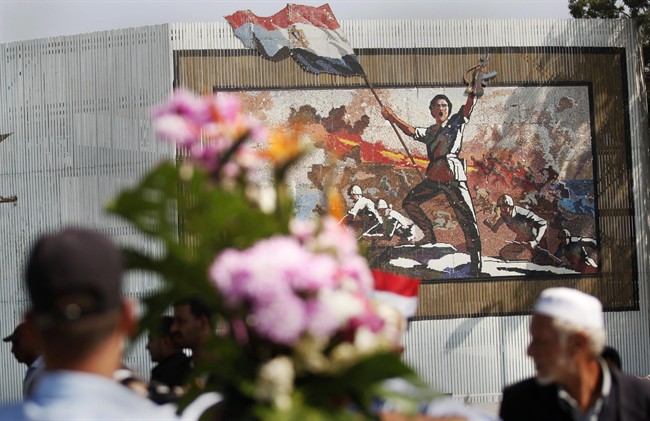CAIRO – A work slowdown by air traffic controllers delayed scores of flights and left passengers stranded for many hours in Cairo’s international airport, wreaking havoc in the latest example of cascading labour unrest that officials and analysts say is devastating Egypt’s economy.

Thursday’s protest at Cairo International Airport was over a decision to rescind a promised bonus. It forced the delay of more than 200 flights and turned Egypt’s flagship airport into a microcosm of the general mayhem that has come to define the country since the uprising that ousted former President Hosni Mubarak in February.
Egyptian Labor Minister Ahmed El-Boraie warned this week that the country is going through a “critical period and (was) on the brink of bankruptcy,” according to the daily, Al-Masry al-Youm. Egypt’s “losses are growing day by day,” he was quoted as saying. “Either we band together and change the current situation, or let Egypt be destroyed.”
However, other officials, including the finance minister, have taken a softer tone. They say the country faces challenges, but worker grievances are justified after decades of low salaries.
The labour action coincided with a highly symbolic day in Egypt – as the country’s post-Mubarak military rulers put on a show of strength to mark the 38th anniversary of the 1973 Arab-Israeli war. The celebration came against a backdrop of waning public confidence in their commitment to move the country to civilian rule.
Field Marshall Mohammed Hussein Tantawi, who heads the ruling military council that took power from Mubarak, said in a speech marking the anniversary of the October war that the country was going through a critical period in terms of security and the economy.
Egypt “is witnessing a comprehensive transformation of its national course … as changes and crises loom on the horizon,” Tantawi said. “People, despite their different political and nonpolitical orientations, must realize the ramifications and what it takes to get out of that rough road.”

Get daily National news
The partial strike was the latest labour action in months of near daily protests in virtually every sector of the economy.
The strikes picked up in mid-February after Mubarak’s ouster. In the first three months after he left office, the labour unrest nearly crippled the economy as manufacturing ground to a halt, tourism revenues plummeted and foreign investment dried up.
Workers demand higher pay, more jobs and a narrowing the wide salary gaps in which some “consultants” or top executives within the public sector can bring home more than $30,000 per month in a country where the per capita annual income is about $2,600. The striking workers also demand changes in company and union leadership and reforms in their sectors.
The unrest has exacerbated the already significant hardships of daily life in Egypt.
“It was a mob scene,” Meg Conner, a Canadian teacher living in Egypt, said of the scene at the Cairo airport as she waited more than 11 hours to board a delayed flight to Greece on Thursday. “People were pushing and yelling. Airport workers climbed on the conveyer belts and started screaming,” she added. “It was the worst I have seen in my life.”
Though their demands were not met, the controllers called off their strike around sundown.
More broadly, the work stoppages have essentially forced the military rulers and the interim government which was appointed by them to cave in to worker demands by raising salaries and pensions, and instituting a new minimum wage in the public sector. However, some officials and analysts claim the country can ill afford the concessions.
Economic indicators point to troubling times ahead for Egypt – where more than 40 per cent live around or below the World Bank poverty line of $2 per day.
Central Bank figures show that net international reserves fell to $25 billion by the end of September, 33 per cent below pre-revolution levels of roughly $36 billion at the end of December. The slide is linked, at least partly, to supporting the Egyptian pound, which has faced steady depreciation pressure since January. A sharp drop in its value could stoke inflation by raising the cost of imports.
The budget deficit for the current fiscal year has widened and tourism, a key source of revenue, is down sharply. Government figures show the number of tourists arriving fell almost 29 per cent in June compared to the same month in 2010.
The Egyptian benchmark stock index is down 44 per cent year-to-date and there is little indication foreign investors are looking for bargains here.
Only about $500 million of $7 billion pledged by the oil-rich Gulf nations has materialized and the country needs about $10 billion to cover a spending gap this year, say economists.
Investment banks and analysts have again revised down growth forecasts for next year. London-based Capital Economics notched the GDP growth projection down to 3 per cent from 4 per cent earlier. GDP grew 1.8 per cent in the 2010-2011 fiscal year, well below the nearly 6 per cent projected before the revolution.
“It all goes back to expectations, and what people expected … post-revolution,” said Capital’s chief Mideast economist Said Hirsh. Many Egyptians had hoped Mubarak’s ouster would usher in speedy reforms, higher salaries, more jobs, greater transparency and accountability of former officials.
“Now they’re being hit with the reality that it’s not that simple,” Hirsh said.
___
Associated Press writer Sarah El Deeb contributed to this report from Cairo.





Comments